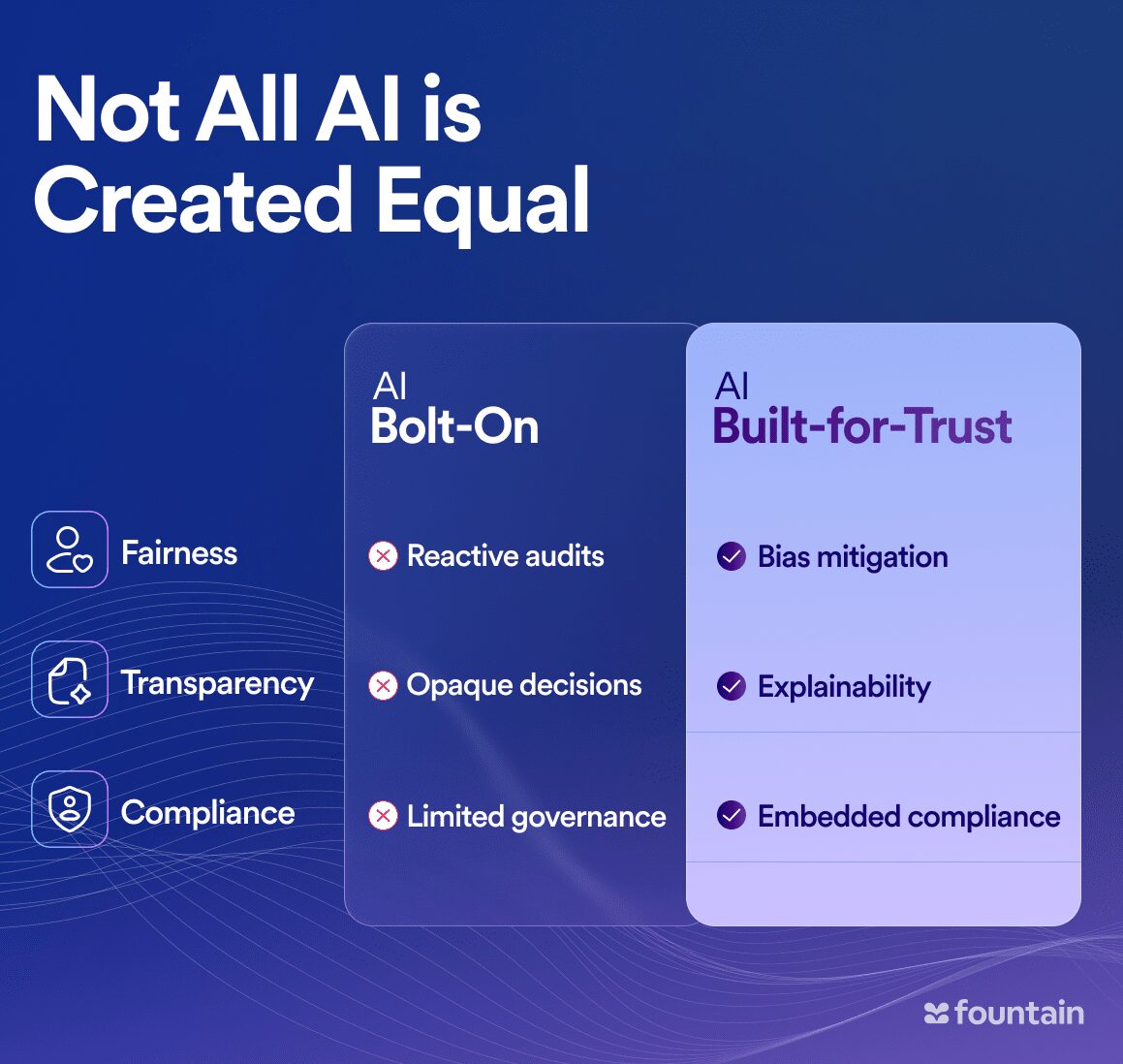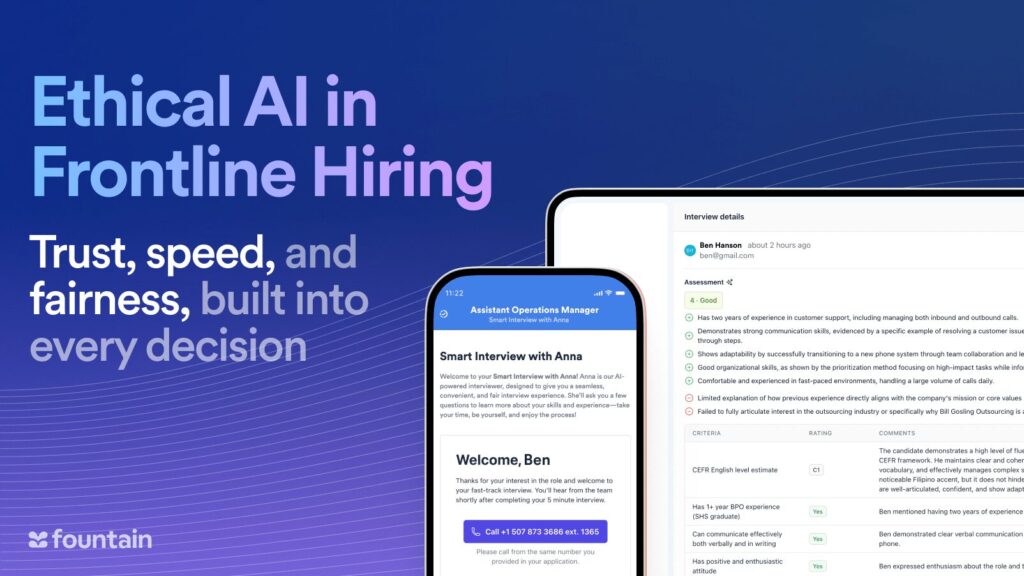
HR leaders in frontline industries understand that hiring at scale is about more than just speed. It also requires trust, fairness, and compliance at every stage. Ethical AI plays a critical role in making that possible.
AI can help with hiring in retail, hospitality, logistics, and cleaning, but it also brings new problems to solve.
To fully realize the benefits of AI in hiring, ethics can’t be an afterthought. Teams must embed it from the beginning. Adding AI to traditional platforms without the proper safeguards can accidentally reinforce bias and introduce new compliance risks.
These risks are even greater in frontline hiring, where speed and scale leave little room for error. Putting trust first means starting with fairness, transparency, human checks, and compliance. This approach does more than protect your company; it helps you hire more responsibly and build a long-term advantage.
The Importance of Ethical AI in High-Volume Hiring
When you’re hiring thousands of hourly workers, speed matters, but so do fairness and compliance. AI can help by reducing bias and speeding up screening, but it also presents real concerns. It can learn bias from past data, make decisions without clear reasons, and miss important legal or diversity requirements. If not handled carefully, this can lead to legal trouble and damage trust with candidates.
HR leaders are thinking carefully about these risks. Big mistakes such as Amazon’s AI tool unfairly filtering out women and HireVue’s use of facial analysis illustrate how quickly things can go wrong. Rules around hiring technology are also getting stricter. Any AI used to hire people must follow fair hiring laws and treat everyone equally.
Ethical AI is no longer a nice-to-have in modern hiring: it is a foundational requirement. Systems that unfairly exclude candidates or cannot explain their decisions threaten diversity goals, brand reputation, and legal compliance.
Developers must build AI to be fair, transparent, and closely monitored from the start.
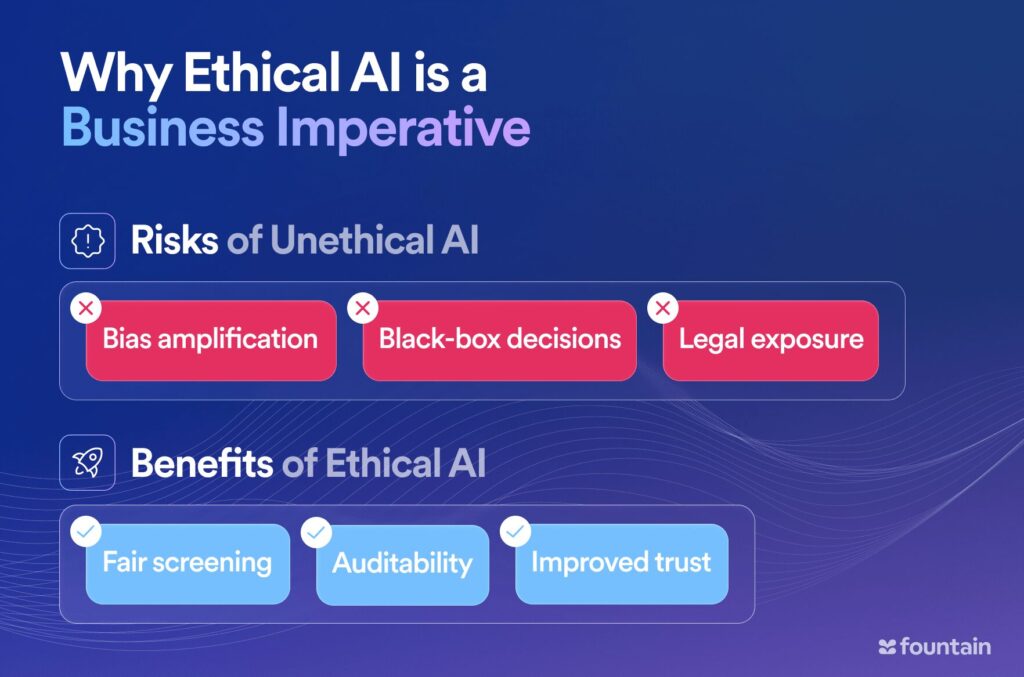
“Bolt-On” AI vs. AI Built for Trust
The quality and integrity of AI used in HR can differ greatly. Many vendors treat AI as an add-on, something tacked onto an existing ATS or hiring tool without changing how the process works. Some vendors include chatbots or scoring tools, but they deal with fairness later, using bias audits or broad disclaimers.
This approach fixes problems after they happen, like installing airbags after a crash. HR leaders need to prioritize building trust from the outset rather than trying to add it later.
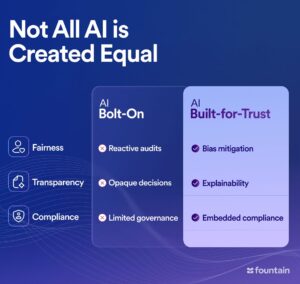
Fountain takes a different approach to AI in hiring. Trust and compliance aren’t add-ons or marketing buzzwords; they’re part of the foundation.
From day one, we built ethics into the entire development process. We didn’t save fairness, accountability, or transparency for a final review. Instead, we started with key questions:
- How can AI actively reduce bias and increase transparency?
- How can we ensure that every decision is transparent and able to withstand audit and regulatory review?
We built our system around these values so HR teams can move faster without losing fairness, compliance, or accountability.
This is what responsible innovation looks like.
What Ethical AI Looks Like in High-Volume Hiring
AI is playing a bigger role in hiring, especially for frontline and hourly jobs. That means using it responsibly isn’t optional, it’s essential.
To make AI both effective and fair, companies need to plan ahead and put the right safeguards in place.
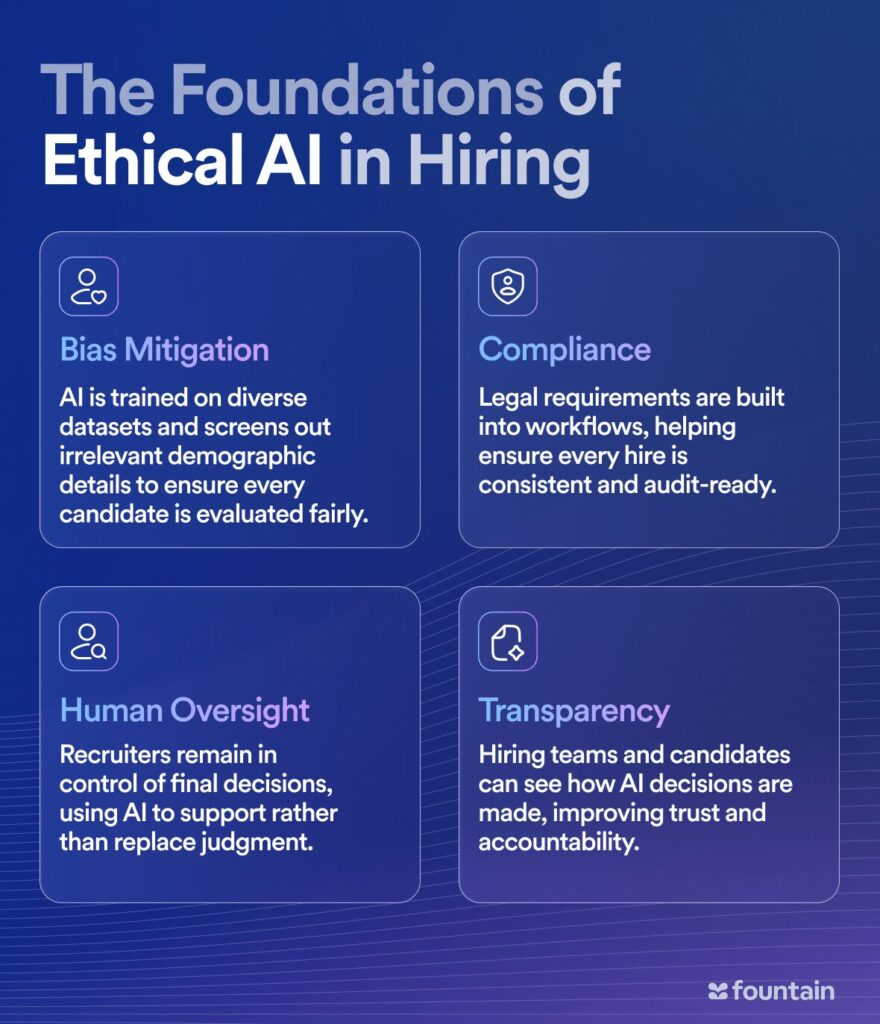
In high-volume hiring, trustworthy AI is built on four key pillars:
- Bias mitigation
- Transparency
- Human oversight
- Built-in compliance
These elements help create systems that are fast, fair, and ready to scale.
1. Bias Mitigation by Design
AI can pick up bias from past hiring data, especially if that data includes unfair patterns based on gender, race, or age. If no one steps in to correct it, the AI can repeat those biases or make them worse.
Responsible platforms take steps to prevent this. They:
- Hide demographic information during candidate scoring
- Use diverse training data
- Audit their systems regularly to catch and fix bias
- Flag biased language in job descriptions
- Remove personal details that could lead to unfair screening
These safeguards help employers judge candidates based on their skills, not on unrelated personal details. This is especially important in frontline industries, where applicants come from many different backgrounds.
2. Transparent, Explainable AI
AI in hiring should be transparent and easy to understand. HR teams and candidates should be able to see exactly how platforms make decisions.
Clear, explainable AI helps answer questions like:
- Was this candidate moved forward because of their skills, availability, or screening answers?
- What criteria influenced the decision?
- Can we identify patterns or gaps in the way the system makes hiring decisions?
When hiring teams can see and understand how the system works, they are better equipped to catch mistakes, build trust, and stay accountable.
This level of transparency is not just a best practice, it is quickly becoming a legal requirement. As more regions roll out AI regulations, platforms that can clearly show how their tools make decisions will be better prepared to stay compliant.
3. Human-in-the-Loop Oversight
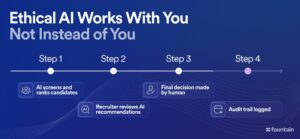
AI should not be solely responsible for making hiring decisions. Human judgment is essential when reviewing skills or making final hiring decisions.
In high-volume environments, AI can help by handling repetitive tasks like:
- Screening resumes
- Scheduling interviews
- Answering candidate FAQs
The most effective systems use a “human-in-the-loop” model:
- AI gives recommendations
- Recruiters make the final call
This approach lowers the risks of using AI and makes sure people stay involved with empathy, context, and responsibility.
4. Built-In Compliance Controls
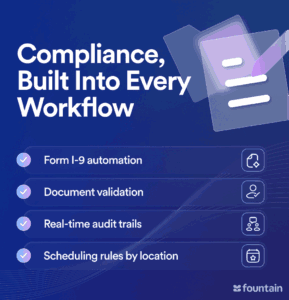
Hiring at scale, especially for frontline roles, comes with complex compliance challenges. These can include:
- Verifying Form I-9s
- Following local scheduling laws
- Meeting labor protections across different states or regions
Modern platforms simplify this by building compliance into the hiring workflow. For example, they can:
- Flag missing documents
- Validate ID submissions
- Create real-time audit trails
- Adjust schedules based on local labor laws, such as rest periods, overtime, or youth labor rules
By automating these steps, companies reduce legal risk and avoid delays. This makes it easier to stay compliant while hiring quickly.
The Value of Ethical AI
When built with ethics in mind, AI doesn’t just speed things up, it strengthens operations and reduces risk.
Ethical AI does more than protect candidates. It also:
- Protects your brand
- Ensures compliance
- Builds trust across HR teams and leadership
One Director of Talent at a national grocery chain put it simply:
“We’ve eliminated compliance misses entirely. It’s built into our hiring flow now. No chasing paperwork, no last-minute surprises.”
The right AI helps companies hire smarter while staying safe, consistent, and confident.
Building Ethical AI into Hiring Systems: Why It Matters
Ethical AI in hiring isn’t just about meeting regulations or avoiding bad press. It plays a critical role in building fair, efficient, and future-ready hiring systems.
What Ethical AI Looks Like
The best hiring platforms are designed to support human decision-making, not replace it.
Their goal is to:
- Reduce bias in screening
- Improve consistency in evaluations
- Speed up and simplify the candidate experience
AI should act as a tool that helps recruiters identify talent more efficiently and fairly.
Built-In from the Start
Leading systems embed ethics into every step of development, not just as a final check.
That includes:
- Ongoing model testing for bias
- Regular updates to keep up with workforce and equity standards
- Feedback loops that improve performance over time
- Strong privacy and data protections to safeguard candidate information
These practices ensure automation doesn’t come at the cost of fairness or trust.
Why It Works
When candidates trust the process, they’re more likely to finish it. When recruiters trust the tools, they’re more likely to use them effectively.
That shared confidence improves adoption, increases performance, and drives stronger hiring ROI.
The Bottom Line
In high-volume hiring, ethical AI is helping companies hire faster, avoid risks, and earn trust.
It leads to:
- Higher candidate engagement
- Better compliance outcomes
- Smarter, more sustainable workforce strategies
As hiring continues to evolve, companies that lead with transparency and trust will be the ones who stay ahead.
Ethical AI in Practice: Real Results, Not Just Theory
Ethical AI is no longer just an ideal; it’s delivering real, measurable results. Building fairness, transparency, and human oversight into a hiring platform leads to clear results.
Companies using Fountain’s trust-first AI are:
- Hiring faster
- Meeting compliance and equity goals
- Improving candidate experience
- Building stronger talent pipelines
🚀 Results from the Field
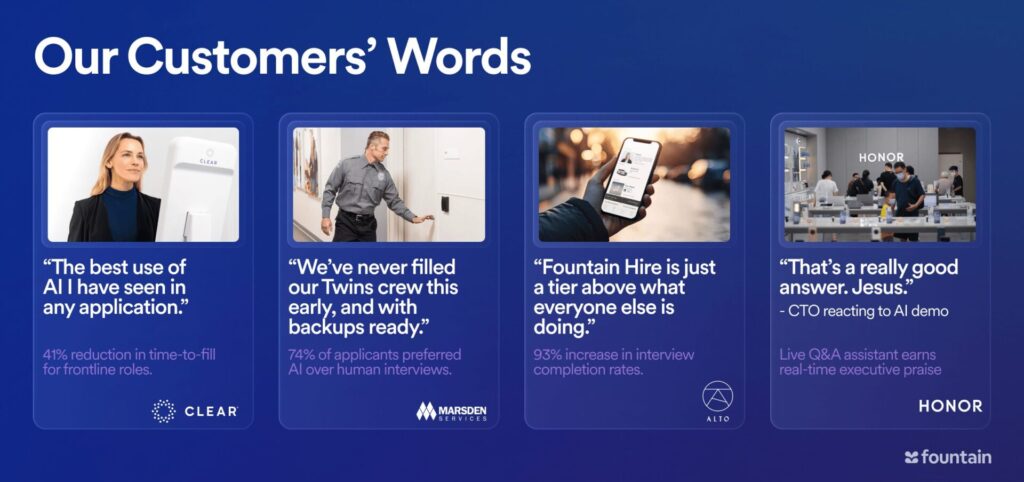
CLEAR (a secure ID platform with high-volume hiring needs)
- 41% faster time-to-fill after adopting Fountain’s AI assistant
- Their CTO called it “the best use of AI I have seen in any application,” proving that speed and fairness can go hand in hand
Marsden Services (a national facilities services provider)
- Filled their Minnesota Twins cleaning crew before Opening Day for the first time ever
- 74% of applicants chose the AI interview over waiting to meet with a person
- Candidates appreciated the speed, convenience, and fairness of automated interviews
Alto (a rideshare company focused on high-quality service)
- 93% increase in interview completion rates after replacing video responses with an interactive AI agent
- Candidates felt more comfortable, engaged, and likely to finish the process
- “Fountain Hire is just a tier above what everyone else is doing,” shared a program manager at Alto
Honor (Home Instead parent company)
- After hearing the AI assistant’s live demo, the CTO responded simply: “That’s a really good answer. Jesus.”
The Bottom Line
These examples show what’s possible when AI is designed with trust from the start. Companies see faster hiring, stronger engagement, and better compliance, without trade-offs.
Ethical AI isn’t just working, it’s redefining what great hiring looks like.
Conclusion: Trust is the Future of AI in Hiring
Frontline industries continue to face major challenges such as labor shortages, high turnover, and rising pressure to move faster. AI has become a powerful tool to meet those demands, but how companies use it matters just as much as what they use.
Simply layering AI onto outdated systems, without considering fairness or compliance, adds risk instead of value.
A Better Approach: Build Trust In from the Start
The most effective way to adopt AI is by embedding trust into the foundation of your hiring platform. That means using systems designed to:
- Reduce bias
- Explain decisions clearly
- Support human oversight
- Stay compliant with labor and privacy laws
When done right, AI becomes a strategic advantage, not just a technical upgrade. Ethical AI helps HR teams move faster and make smarter choices without compromising on values or compliance.
Fountain’s Approach: Governance That Scales
Fountain’s work shows that ethical AI does not slow innovation; it accelerates it. By building governance and accountability into the core of our platform, we help companies scale confidently and responsibly.
For HR leaders managing high-volume hiring, this is a chance to set a new standard. The future belongs to organizations that choose tools that are not only powerful but also principled.
Ethical AI Is a Brand Advantage
Choosing ethical AI is more than a compliance box to check. It reflects your brand, your values, and your long-term hiring strategy.
Trust is not an added feature; it is the foundation of a responsible and effective hiring strategy.

